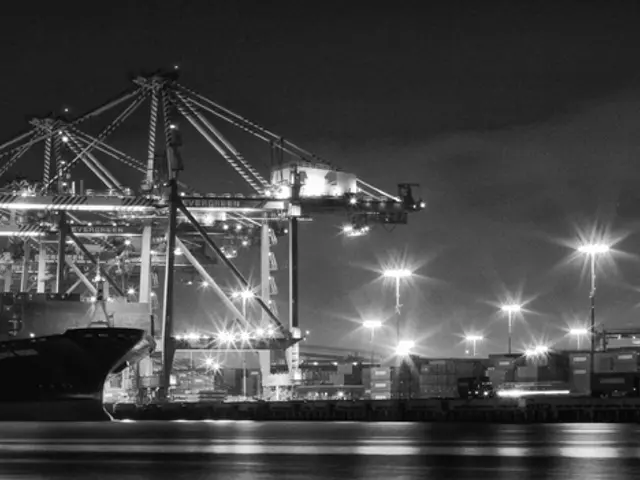Celebrations and commemorations mark the 80th anniversary of V-E Day, featuring parades and tributes. Key insights about this historical milestone are detailed below.
Partying in the Streets: A Look Back at V-E Day
In the bustling cities of London, Paris, and Moscow, this week marks the 80th anniversary of V-E Day - a day of immense historical significance. On this day, Nazi Germany surrendered to the Allied forces, bringing an end to the fighting on the European front of World War II.
While it didn't signal the end of the war completely - the battle against Japan in the Far East continued - it was a moment of triumph for the soldiers and civilians who had endured brutal hardships since the invasion of Poland in 1938.
Streets filled with exuberant parades, flyovers, and memorials. When the surrender was announced, people poured into the streets of London, New York, and Paris. This outpouring of emotion was aptly described by the BBC as a "mood of thanksgiving."
Let's delve into the events leading up to V-E Day, and its profound impact.
The Timing of Victory
A common question: When is V-E Day? In the Western world, it's celebrated on May 8. However, the answer is not quite that straightforward.
The official surrender was accepted by General Dwight Eisenhower at 2:41 a.m. on May 7, in a ceremony at Reims, France. Despite the news leaking out by the evening, the official announcement was delayed until May 8 to coordinate with the Soviet Union, which had concerns about the terms of surrender.
A second surrender document was signed at midnight on May 8 in Berlin, addressing Soviet concerns. Russia celebrates Victory Day on May 9 to match their time zone.
The Path Towards Victory
By June 25, 1940, Hitler's forces had control of most Europe and were threatening an invasion of Britain. However, the tide began to turn early in 1942, when the Soviet Red Army triumphed over the German forces attempting to take Moscow.
Hitler's decision to invade the Soviet Union - a strategic mistake according to Rob Citino, a retired senior historian at The National WWII Museum in New Orleans - led to a series of crushing defeats for the Germans.
The Fight for Berlin
Soviet forces commenced their assault on Berlin on April 16, 1945, while the Allies were still pushing through western Germany. With the city in ruins and the Red Army advancing street by street, Hitler retreated to his bunker beneath the Reich Chancellery, where he ultimately took his own life on April 30. The last defenders surrendered on May 2.
A Bittersweet Victory
V-E Day was a day of relief and jubilation, yet it also brought waves of reflection. While many lit bonfires and threw back the blackout curtains, others thought about the loved ones they had lost and the impact of the Holocaust. The victory was tinged with sadness for many as it brought no guarantee of the safe return of their loved ones.
As the world still grappled with the war's aftermath, the Japanese continued to fight fiercely to protect their homeland. The Allied soldiers, anticipating deployment to the Far East, knew that their victory was not yet complete.
The Japanese eventually surrendered on August 2, following the U.S.'s devastating atomic bombings of Hiroshima and Nagasaki.
Veterans Remember
V-E Day gave rise to a sense of camaraderie among the victors. Dorothea Barron, a 100-year-old Wrens veteran, recalled the determination to stop the Germans from setting foot in England, in what became an unwavering battle of man, woman, and child.
Mervyn Kersh, another 100-year-old veteran, highlighted the importance of standing up to bullies and despots, emphasizing that remembering the past is essential but taking action is crucial.
References:1. Associated Press. (2021, May 4). Historic 1945 photo captures Reims days before Germany's surrender. The Philadelphia Inquirer. Retrieved from https://www.inquirer.com/news/nation/historic-1945-photo-captures-nazi-surrender-20201212.html2. Kaminski, M. (2021, May 1). The Day That Never Officially Ended WWII. The Stay Sorted. Retrieved from https://thestaysorted.com/featured/may-8-ve-day/3. The National WWII Museum. (n.d.). The Battle for Berlin. Retrieved from https://www.nationalww2museum.org/learn/articles/battle-berlin4. The National WWII Museum. (n.d.). V-E Day: Victory in Europe. Retrieved from https://www.nationalww2museum.org/history/v-e-day-victory-europe
- Seattle's streets might have echoed with the same emotions as those in Paris, as the 80th anniversary of V-E Day celebrations unfold.
- The end of World War II in Europe was marked by politics and general news, with the official surrender taking place in Reims, France, on May 7, 1945, but the Western world celebrates V-E Day on May 8.
- As the war in the Far East continued, the people of Seattle, like those in New York and Paris, eagerly awaited the defeat of Japan, knowing that their victory was not yet complete.
- Reflecting on V-E Day, Seattle's veterans might share stories of the camaraderie and determination they felt, ensuring that the memories of the past serve as a reminder to stand up to bullies and despots, much like Mervyn Kersh, a 100-year-old veteran, emphasized.









